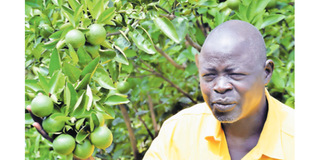How refugee project is changing lives

Mr Patrick Aluma, a Development Response to Displacement Impact Project beneficiary on his farm in Moyo District on September 10, 2024. PHOTO | RASHUL ADIDI
What you need to know:
- The project’s impact extended beyond livelihoods. By June 2024,it had contributed to building 924 fully furnished primary school classrooms, equipped with rainwater tanks and other amenities.
For nearly 20 years, 54-year-old Patrick Aluma Waigo lived a modest life as a subsistence farmer in Aluru Sub-county, Lea Parish, Moyo District in northern Uganda.
His aspirations never extended beyond growing enough food for his family, as he struggled with poverty and lacked the means to increase his household income for a better life.
By 2016, frustrated by the meagre yields from his small rice farm, which couldn't sustain his family, Aluma devised a plan.
He approached fellow residents of Pamoju East Village, proposing the formation of a communal farming group. Members would work together on each other's farms, contributing six hours of labour in a rotating cycle.
A total of 13 members embraced the idea, and they launched a self-help cultivation system. However, despite their efforts, the farm yields remained just enough for home consumption.
"We would sweat with hoes, our families would be food secure, but poverty persisted. Some members even hosted refugees from Sudan, increasing the demand for food and basic needs," Aluma recalled in an interview with the Daily Monitor on Tuesday.
The group, informally called Pamoju Core Farmers Dragudu Saviour, strengthened the spirit of collaboration and reduced individual laziness.
In early 2021, Aluma learnt from a friend that the government was looking to support organised groups through a project aimed at boosting household incomes. The only requirement was formal registration.
Today, Aluma chairs the group,which received a Shs13.5 million grant from the Development Response to Displacement Impact Project (DRDIP) about three years ago. The group has since transitioned to commercial farming, primarily focusing on orchards and rice cultivation.
Benefits
"We operate in a way that each member manages their own agribusiness, and we aggregate our produce for marketing. For instance, we have about 30 acres of orchard farming, with 100 trees per acre. Each tree produces two sacks of oranges per season, which we sell for between Shs150,000 and Shs200,000," he explained.
DRDIP was established in response to the challenges posed by the influx of refugees in Uganda, Djibouti, Somalia, Kenya, and Ethiopia in 2016.
Member states of the Inter-Governmental Authority for Development (IGAD) agreed to a shift in strategy, where host communities would be supported to address socio-economic and environmental challenges. In Uganda, which currently hosts more than 1.6 million refugees, the project was implemented under the Office of the Prime Minister in 2017 across several districts, including Adjumani, Arua, Hoima, Isingiro, and Moyo, among others.
Mr Robert Limlim,the project director, said DRDIP started with $200 million (about Shs739 billion), comprising $50 million (about Shs185 billion) in credit and $150 million (about Shs554 billion) in grants from the World Bank. The funds supported programmes in social economic services, infrastructure, environmental management, livelihoods, and policy accountability.
"Three years on, the project has benefited 77,593 individuals through 3,328 sub-projects, and 1,016 grant groups in both host communities and refugee settlements," Mr Limlim said.
Additionally, DRDIP established 621 village revolving funds, 1,937 self-help groups, and 44 agro-processing facilities to enhance value-addition initiatives like packaging and storage.
The project’s impact extended beyond livelihoods. By June 2024,it had contributed to building 924 fully furnished primary school classrooms, equipped with rainwater tanks and other amenities.
At the secondary level, 133 classrooms, staff houses, dormitories, laboratories, and ICT libraries were constructed and equipped. In healthcare, the project facilitated the construction and equipping of 35 general wards,18 maternity wards, staff housing, theatres, and other facilities.
DRDIP also built 31 bridges and 1,187 kilometres of roads in refugee-hosting districts. In the water and environment sector, 21 water projects benefitted 152,052 households, while 5,610 hectares of deforested land were restored.
Tree plantations covering 4,615 hectares were also established, creating temporary jobs for 145,117 households, who earned Shs11.9 billion.
At least 7,325 beneficiaries were trained in making energy-efficient stoves and briquettes, and more than 100,000 people received solar lighting systems. Additionally, 310 hectares were brought under irrigation.
Enterprise Uganda, a key implementing partner, has been pivotal in developing business skills. Mr Charles Ocici, the executive director, highlighted their focus on fostering a positive business mindset and resilience, particularly among refugees and host communities in Moyo District.
"DRDIP has made significant progress in supporting refugee-hosting districts. Now that infrastructure is in place, it’s essential to help locals build sustainable ventures. Enterprise Uganda is here to assist in realising that dream," Mr Ocici said.
To date, Enterprise Uganda has trained more than 5,000 DRDIP beneficiaries from 220 groups across Koboko, Yumbe, and Moyo districts.
The State Minister for Primary Education, Ms Joyce Kaducu, emphasised the importance of recognising refugees as economic assets.
"Many refugees come with practical skills that can benefit the local economy. Others have the potential to acquire such skills through education and support," she noted.
A 2021 International Finance Corporation report estimated that Uganda’s refugee market was valued at Shs1.7 trillion, highlighting the potential for further national development.




